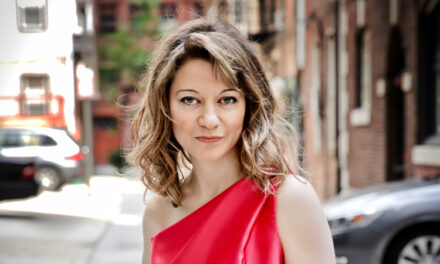No one minded the absence of sets, costumes or exotic animals; the voices exceeded expectations and the music commanded everyone’s attention. The Piedmont Opera Theatre’s presentation is more than a “concert version” of an opera even though it eliminates many of the trappings of “grand opera.” Characters appear dramatically on stage at the perfect moment, priests file ominously across the back of the stage en route to condemning the hapless General Radamès to be buried alive, and temple priestesses invoke their gods from backstage. Trumpets celebrate triumph antiphonally from the balconies of the Stevens Center, and discrete projections on the scrim behind the orchestra provide visual cues in the absence of scenery. The result is a stunningly successful focus on the music.
Commissioned to celebrate the opening of the Suez Canal and set in ancient Egypt, Aïda is an exotic variant of the eternal love triangle where the lovers are of opposing and warring sides. Aïda, Ethiopian, is the slave of the Egyptian princess, Amneris. Both love (secretly) the young general, Radamès, who in turn loves Aïda (secretly). The spoils of war include the capture of Aïda’s father, Amonasro, who turns out to be the King of Ethiopia (also kept secret until Act III). The King of Ethiopia coaxes the war plans out of the young general and is overheard by Radamès and Ramfis, the high priest. He is condemned to be entombed alive while Amonasro flees with his daughter, Aïda. However, Aïda hides in the tomb to share the fate of her lover, while Amneris mourns her loss and prays for peace, unaware that the lovers are united for eternity.
The singers at the October 8 performance were superb, from the smallest part to the title role. Aïda, soprano Angela Simpson, sang her famous dramatic first act aria, “Ritorna vincitor…” (“Return victorious…”), with dismay that she has urged her beloved Radamès to conquer her homeland. When she sang “Numi, pietà” (“Gods, pity me”), one of my favorite moments in the entire opera, she was achingly intimate as she intoned her prayer over the hushed tremolo of the Winston-Salem Symphony’s string section.
Her suitor, Radamès, sung by tenor Michael Austin, blustered appropriately as the general about to lead a war campaign against Aïda’s people yet was movingly tender, as when he discovers Aïda has joined him in death. His “Celeste Aïda, forma divina” in Act I brought down the house. This taxing role took its toll in the third act, where fatigue seemed a factor, but the fourth act brought some of Austin’s best singing, with subtly shaded pianissimo entrances, and the rapturous duet of farewell to the earth, “O terra, addio.”
Tichina Vaughn, mezzo-soprano, was a wily and scheming Amneris, contriving to test Aïda. Vaughn blessed with a beautiful and powerful voice and ability to communicate even the most subtle nuances with her face and crafty eyebrows, which brought high drama to her performance. She has been missing from the stage of the Stevens Center for too long!
The role of Aïda’s father, Amonasro, was sung by Derrick Lawrence (Vaughn’s husband, off-stage). He sang with excellent intonation and passion coloring his rich baritone voice, and he was in the best form this reviewer has heard. He, too, was expressive in his villainous role, pitting daughter against lover, princess against slave, in his attempt to persuade her to betray her lover.
The other two singers who completed the excellent sextet were the deep bass, Chris Roselli, as the King of Egypt (Amneris’s father), and bass-baritone Ashraf Sewailam, as the high priest, Ramfis. Alphonso Cherry showed great potential in the short role of the messenger, and the beautiful voice of Emily Amber Newton, as the off-stage High Priestess, completed this well-balanced cast.
This was also a fine showcase for the many choruses Maestro James Allbritten leads in Winston-Salem. The combination of three very fine choruses – the Piedmont Opera Chorus, the NCSA Cantata Singers, and the Winston-Salem Symphony Chorale, 110 singers in all – provided a powerful counterpart to the large symphony orchestra on stage. Often divided into only men or women, the full chorus made the famous scene of triumph in Act II a thrilling moment that the audience savored.
Allbritten is an impressive conductor, using his score only rarely. His boundless energy was clearly and easily transferred to the orchestra, which multiplied it to shake the rafters of the Stevens Center. From the soft divisi string entrances that announce Aïda’s theme and the crisp brass entrances of the Prelude all the way to the outpouring of sound, pomp and bombast of Act II, the orchestra was in great form. But it was in the softest moments that one held one’s breath – tremolos, trills and harmonics make up much of Verdi’s softer palette. Moments like the haunting insinuations of oboist John Ellis in Act III and doublebass prayer and the accompaniment of bass-clarinetist Eileen Young in Act IV are what make the listeners realize the genius of Verdi as an orchestrator.
This reviewer hopes the leadership of the Piedmont Opera Theatre will take to heart the success of the evening’s performance. Please give us more “Opera in Concert.”
Aïda is repeated today (10/10) and Tuesday (10/12). See our Triad calendar for details.
* CVNC is pleased to welcome to its roster Maestro Peter Perret, distinguished scholar, educator and Conductor Emeritus of the Winston-Salem Symphony. A brief bio appears immediately below.
Born in Minnesota to a family of artists and scientists, Peter Perret was the Music Director of the Winston-Salem Symphony from 1978 to 2004. Previously Perret had served the Buffalo Philharmonic as Exxon/Arts Endowment Conductor for three years, and before that he was Principal Conductor of the Capetown Symphony (South Africa). Perret frequently lectures and leads workshops on the relationship of music to learning. Perret has co-authored a book (with Janet Fox), A Well-Tempered Mind: Using Music to Help Children Listen and Learn , aimed at parents and teachers, released by the Dana Press in October 2004.











